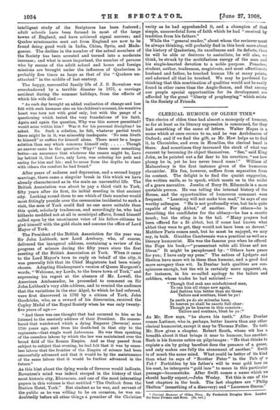CLERICAL HUMOUR OF OLDEN TIME.*
THE clerics of olden time had almost a monopoly of humour,
so far at least as its literary expression is concerned, for they had something of the same of letters. Walter Mapes is a name which at once occurs to us, and he was Archdeacon of Oxford ; and if we find the gift, as Mr. How helps us to find it, in Chronicles, and even in Homilies, the clerical hand is there. And sometimes they increased the stock of what was current by becoming its object themselves. "See," said King John, as he pointed out a fat deer to his courtiers, "see how plump he is, yet he has never heard mass !" William of llalmesbury is the first instance given of the humorous chronicler. His fun, however, suffers from separation from its context. The delight is to find the quaint suggestion, the written smile, so to speak, which meets us in the midst of a grave narrative. Jocelin of Bury St. Edmunds is a more quotable person. He was telling the internal history of the House, and the opportunities of humorous comment were frequent. "Learning will not make him mad," he says of one worthy colleague. "He is not profoundly wise, but he is quite capable of being Abbot," of another. For others—he is describing the candidates for the abbacy—he has a caustic touch ; but the sting is in the tail. Many prayers had been offered for a fit abbot, but if some had known what abbot they were to get, they would not have been so devout."
Matthew Paris comes next, but he must be enjoyed, we may say, in bulk. Giraldus Cambrensis was a practical as well as a literary humourist. His was the famous pun when he offered the Pope his book,—" praesentant vobis alii libras sed nos libros." It might be paraphrased by: "Others have pence for you; I have only my pens." The satires of Lydgate and
Skelton have more wit in them than humour, and a good deal more savagery than wit. In Dunbar both qualities are con- spicuous enough, but the wit is certainly more apparent, as,
for instance, in his so-called apology to the tailors and cobblers, whose trades he had satirised:— "Though God mak ane rnisfashioned man, Ye can him all shape new again, And fashion him better than sic three: Tailors and souttars, blest be ye In earth ye do sic miracles here,
In heaven ye shall be sanets full clear : Though ye be knaves in this countrie : Tailors and souttars, blest be ye :" As Mr. How says, "he shows his teeth." After Dunbar comes Latimer, who is, perhaps, better known than any other clerical humourist, except it may be Thomas Fuller. To both
Mr. How gives a chapter. Robert South, whose wit has a breadth about it that brings it near to humour, has another.
Such is his famous satire on pilgrimages : "He that thinks to expiate a sin by going barefoot does the penance of a goose, and only makes one folly the atonement of another." Swift is of much the same mind. What could be better of its kind
than what he says of "Brother Peter" in the Tale of a Tub ? Forbidden by his father's will to wear gold lace on his coat, he interprets "gold lace" to mean in this particular
passage—broomsticks. After Swift comes a name which we should hardly expect,—John Wesley. Yet this is one of the best chapters in the book. The last chapters are "Philip Skelton" (something of a discovery) and "Laurence Sterne."
Clerical Humour of Olden Time. By Frederick Douglas How. London Sir Isaac Pitman and Sons. [6s. net.]






















































 Previous page
Previous page